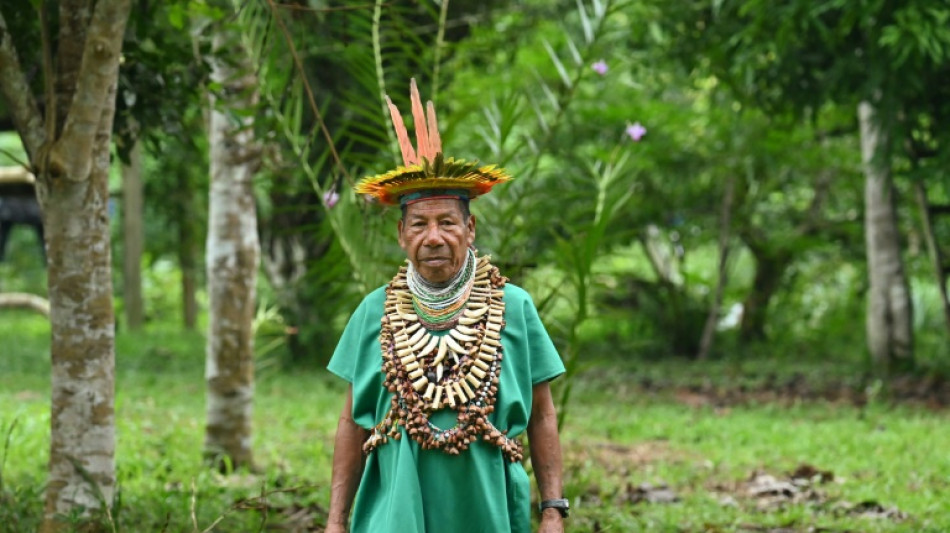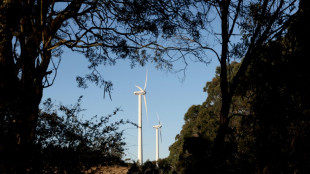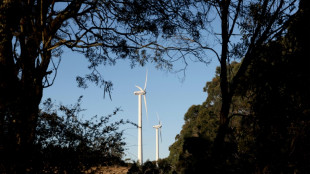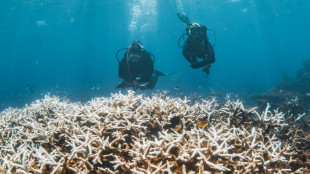
-
 Turkey's opposition says Erdogan's canal plan behind latest arrests
Turkey's opposition says Erdogan's canal plan behind latest arrests
-
Maresca hails 'nasty' Chelsea as top five bid stays alive

-
 Trump raises Putin doubts after Zelensky talks at pope's funeral
Trump raises Putin doubts after Zelensky talks at pope's funeral
-
Major blast at Iran port kills 4, injures hundreds

-
 Napoleon's sword to be sold at auction in Paris
Napoleon's sword to be sold at auction in Paris
-
Iran, US discuss nuclear deal in third round of talks

-
 Buenos Aires farewells native pontiff with call to action
Buenos Aires farewells native pontiff with call to action
-
Warholm sets hurdles world record at Diamond League, Holloway shocked

-
 US students 'race' sperm in reproductive health stunt
US students 'race' sperm in reproductive health stunt
-
Wikileaks founder Assange joins crowds for pope funeral

-
 Leader Marc Marquez claims Spanish MotoGP sprint victory
Leader Marc Marquez claims Spanish MotoGP sprint victory
-
Celtic win fourth successive Scottish Premiership title

-
 Jackson ends drought as Chelsea boost top five push
Jackson ends drought as Chelsea boost top five push
-
Warholm sets 300m hurdles world record in Diamond League opener

-
 Major blast at south Iran port kills 4, injures hundreds
Major blast at south Iran port kills 4, injures hundreds
-
Russia says retook Kursk from Ukraine with North Korean help

-
 Francis laid to rest as 400,000 mourn pope 'with an open heart'
Francis laid to rest as 400,000 mourn pope 'with an open heart'
-
Trump, Zelensky meet on sidelines of pope's funeral

-
 'Shared loss': Filipino Catholics bid Pope Francis farewell
'Shared loss': Filipino Catholics bid Pope Francis farewell
-
Families unable to reunite as India-Pakistan border slams shut

-
 Major blast at south Iran port injures hundreds
Major blast at south Iran port injures hundreds
-
Foreign carmakers strive for 'China Speed' to stay in race

-
 Pakistan says open to neutral probe into Kashmir attack after India threats
Pakistan says open to neutral probe into Kashmir attack after India threats
-
Hundreds of thousands at funeral mourn pope 'with an open heart'

-
 Quartararo sets Spanish MotoGP record to claim pole
Quartararo sets Spanish MotoGP record to claim pole
-
Hamas says open to 5-year Gaza truce, one-time hostages release

-
 Iran, US hold new round of high-stakes nuclear talks
Iran, US hold new round of high-stakes nuclear talks
-
Up at dawn for front-row seat to history at Francis's funeral

-
 Pakistan ready to 'defend sovereignty' after India threats
Pakistan ready to 'defend sovereignty' after India threats
-
Huge crowds flock to Vatican for Pope Francis's funeral

-
 Xi says China must 'overcome' AI chip challenges
Xi says China must 'overcome' AI chip challenges
-
Indian army says new exchange of gunfire with Pakistan

-
 Epstein accuser Virginia Giuffre takes own life in Australia: family
Epstein accuser Virginia Giuffre takes own life in Australia: family
-
Hundreds of buildings damaged, dozens injured in 6.3 Ecuador quake

-
 India and Pakistan's Kashmir fallout hits economy too
India and Pakistan's Kashmir fallout hits economy too
-
Francis's funeral to be grand farewell to 'pope of the poor'

-
 Pogacar faces defiant Evenepoel at Liege-Bastogne-Liege
Pogacar faces defiant Evenepoel at Liege-Bastogne-Liege
-
Chelsea eye great escape against Barcelona in Women's Champions League

-
 Iran, US to hold new round of high-level nuclear talks
Iran, US to hold new round of high-level nuclear talks
-
'Energy and effort' pay off for Reds as Blues' woes continue

-
 Albatross and closing birdie lift China's Liu to LPGA Chevron lead
Albatross and closing birdie lift China's Liu to LPGA Chevron lead
-
On the horizon? Wave of momentum for high seas treaty

-
 New to The Street Launches For The Causes(TM) Monthly Awareness Segments: Offering Free National Media to Charities and Organizations
New to The Street Launches For The Causes(TM) Monthly Awareness Segments: Offering Free National Media to Charities and Organizations
-
Top Mistakes to Avoid When Building Credit History

-
 Developing countries should fast-track US trade deals: World Bank president
Developing countries should fast-track US trade deals: World Bank president
-
Grizzlies' Morant 'doubtful' for must-win game 4 v Thunder

-
 Trump in Rome for pope funeral in first foreign trip of new term
Trump in Rome for pope funeral in first foreign trip of new term
-
Trump says Russia-Ukraine deal 'very close' after new Kremlin talks

-
 US rookies lead PGA pairs event with McIlroy and Lowry in hunt
US rookies lead PGA pairs event with McIlroy and Lowry in hunt
-
Trump tariff promises get a reality check


Envious shamans and pollution: Diverse threats to Ecuadoran Amazon
When fish numbers diminished in the Ecuadoran Amazon, the Siona Indigenous people blamed envious, rival shamans for blocking the animals' passage through the rivers of Cuyabeno, a biodiverse wetland.
Experts, however, point the finger at pollution, deforestation and climate change wreaking havoc on the second-largest protected area in Ecuador.
Shaman Rogelio Criollo, 74, told AFP the cause of the decline had been revealed to his Siona tribe during a divination ceremony using the sacred hallucinogen ayahuasca, also known as yage.
"A (rival) sage who knew the spirit of the jungle and the spirit of the river ... closed the doors to the fish, the turtles," Criollo told AFP.
But the shaman acknowledges that other factors may also be at play: "Many say it's pollution."
Stretching over some 600,000 hectares, the Cuyabeno lake system and the nearby Lagartococha and Yasuni reserves were in 2017 declared wetlands of international importance under the Ramsar environment treaty.
The area hosts more than 200 species of amphibians and reptiles, 600 types of bird and more than 160 mammal groups.
- 'Alerts for us' -
The risks to the forest oasis are plenty.
"Satellite data shows an extremely serious deforestation process" nearby, reserve director Luis Borbor told a recent conference in Quito on fishing.
The extent of farmland bordering on Cuyabeno rose from 819 hectares in 1985 to over 5,000 hectares in 2022, affecting the soil health and robbing countless species of a home in trees critical to absorbing planet-warming CO2.
Also nearby, illegal mines are polluting water sources upstream from Cuyabeno.
A study by Ecuador's National Biodiversity Institute in February revealed "heavy metals accumulation in fish" in several Amazonian rivers -- including the Aguarico and Cuyabeno that cross the reserve and are a source of food for indigenous peoples.
Experts also suspect the hand of global warming in droughts that are ever more frequent and severe.
Last year, the Laguna Grande -- Cuyabeno's biggest tourist attraction -- dried up twice. It is unusual for it to happen even once a season, said Borbor.
"These are alerts for us to say that there is climate change in this region," he told AFP.
Drought this year in Ecuador saw water levels drop to critical lows, resulting in power outages of up to 13 hours per day as hydroelectric reservoirs ran empty.
On Wednesday, the World Meteorological Organization said Latin America and the Caribbean had their warmest year on record in 2023 as a "double-whammy" of El Nino and climate change caused major weather calamities, including crippling droughts.
- Ancestral help -
As global efforts falter to curb climate change caused by mankind's burning of planet-warming fossil fuels, the Siona deal with their problems the traditional way.
Delio Payaguaje, 72, another Siona shaman, describes a ceremony he took part in to commune with the spirit world, seeking a solution to the fish shortage in Cuyabeno's 14 lagoons.
Dressed in necklaces with animal fangs and feathered headdresses, the shamans prayed to the forefathers, and then went to the river.
There, they saw movements and bubbles in the water, indicative of fish activity, said Payaguaje.
According to Borbor, Indigenous knowledge has been key to conserving Ecuador's nature reserves, which house everything from kingfishers, macaws and herons to monkeys and pink dolphins.
J.Williams--AMWN



